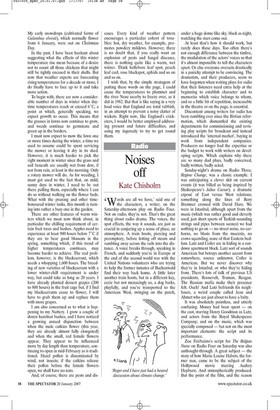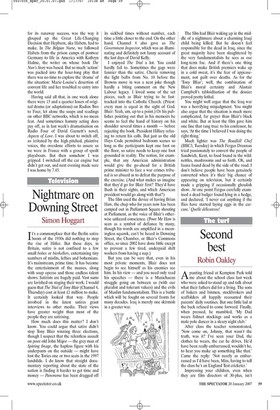Noises off
Kate Chisholm LWords are all we have,' said one of the characters, a writer, on the Saturday-afternoon play on Radio Four. Not on radio, they're not. That's the great thing about radio drama. The voices, the spot effects, the way it sounds, are just as crucial in conjuring up a sense of place, an atmosphere. A train hoots, piercing and peremptory, before letting off steam and rumbling away across the rails into the distance. A voice breaks through, speaking in French, and suddenly you're in Europe at the end of the second world war with the United Nations volunteers who are trying to help the former inmates of Buchenwald find their way back home. A little later another train hoots, but in a different key, eerie but not menacingly so, a dog barks, playfully, and you're transported to the American West, swinging on the porch, under a huge dome-like sky, black as night, watching the stars come out.
At least that's how it should work, but rarely does these days. Too often there's not enough difference between the timbre, the modulation of the actors' voices so that it's almost impossible to tell the characters apart. Or else everyone overacts drastically in a panicky attempt to be convincing. The dramatists, and their producers, seem to have forgotten when writing plays for radio that their listeners need extra help at the beginning to establish character and to memorise which voice belongs to whom, and so a little bit of repetition, inexcusable in the theatre or on the page, is essential.
Discontent among writers for radio has been rumbling ever since the Birtian reformation, which dismantled the existing departments for commissioning and revising play scripts for broadcast and instead introduced the 'internal market', buying in work from independent companies. Producers no longer had the expertise or the budget to work with writers on developing scripts. Which explains why there are so many dud plays, badly conceived, badly written, badly acted.
Sunday-night's drama on Radio Three, Regime Change, was a classic example. I was anticipating a clever skit on current events (it was billed as being inspired by Shakespeare's Julius Caesar); a dramatic exposé of East versus West relations; something along the lines of Rory Bremner crossed with David Hare. We were in Istanbul, although apart from the music (which was rather good and cleverly used, just short spurts of Turkish-sounding strings and pipes between scenes) we had nothing to go on — no street noise, no carhorns, no blasts from the muezzin, no crows squawling, none of that Eastern bedlam. Lutz and Coiler are in hiding in a rundown apartment block. Lutz sort of sounds American but betrays another accent from somewhere, source unknown; Coiler is American. But we never discover why they're in Istanbul, or who they're hiding from. There's lots of talk of previous US presidents, Roosevelt, Truman, Reagan. The Russian mafia make their presence felt. Ouch! And Lutz befriends his neighbours, a weird couple called Jean and Ahmet who are just about to have a baby.
It was absolutely pointless, and utterly confusing. Money had been spent — on the cast, starring Henry Goodman as Lutz, and actors from the Royal Shakespeare Company; and on the music, which was specially composed — but not on the most important elements: the script and its performance.
Zoe Fairbairns's script for The Belgian Nurse on Radio Four on Saturday was also unthought-through. A great subject — the story of how Marie-Louise Habets, the former nun, came to be the subject of the Hollywood movie starring Audrey Hepburn. And atmospherically produced. But the point of the film, and the reason for its runaway success, was the way it glouped up the Great Life-Changing Decision that Hepburn, aka Habets, had to make. In The Belgian Nurse, we followed Habets from the prison camps of postwar Germany to life in America with Kathryn Hulme, the writer on whose book The Nun's Story was based. But so much 'action' was packed into the hour-long play that there was no time to explore the 'drama' of the situation: Marie-Louise's desertion of convent life and her troubled re-entry into the world.
Having said all that, in one week alone there were 15 and a quarter hours of original drama (or adaptations) on Radios Two to Four, let alone the soaps and readings on other BBC networks, which is no mean feat. And sometimes hammy acting does pay off, as in last week's dramatisation on Radio Four of David Garnett's novel, Aspects of Love. I was about to switch off, so irritated by the high-pitched, plaintive voices, the overdone efforts to assure us we were in France with a group of spoilt playabouts. But then somehow I was gripped. I switched off the car engine but didn't get out, and next evening made sure I was home by 7.45.






















































 Previous page
Previous page